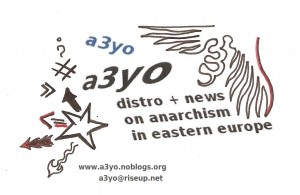(source: http://spring96.org/en/news/36904 )
Paris-Minsk, 26 October, 2010. FIDH and its member organisation in Belarus, Human rights Center Viasna, express their concern regarding the Belarusian authorities’ groundless and growing repression toward certain political activists, in particular those from anarchist and anti-fascist youth movements.
In the early hours of August 31, 2010 the Russian Embassy in Minsk was attacked. A Molotov cocktail was thrown onto the embassy grounds by an unknown assailant, as a result of which a car was burned (without causing any injuries). Instead of a full-fledged investigation into this criminal case, Belarusian criminal investigative agencies began to summon anarchist youth movement activists for “discussions” and interrogations at KGB offices all over Belarus, as a result approximately 30 people were detained, their homes searched, and computer hardware confiscated.
On September 3, 2010 the first mass detentions on suspicion of committing the attack on the Embassy took place in Minsk. Seven anarchist youth movement activists were kept in a temporary detention center for three days. However, on September 6, they were “re-detained” in violation of criminal procedural law, now apparently on a different charge. After three consecutive “re-detentions”, five people were released and two – Alexander Frantskevich and Nikolai Dedok – remained in custody.
Nikolai Dedok was detained by the police on seven separate occasions for three days each time, once even without an explanation on the nature of the charges against him. The activist was then transferred to Pretrial Detention Center No. 1 in Minsk. On October 1, 2010 he was charged with organising an unsanctioned event – referring to a demonstration that took place last year on September 19, 2009. The demonstrators, approximately 30 in all, were protesting the joint Zapad 2009 Russian-Belarusian military exercises that took place in Belarus in September 2009.
During the demonstration an unknown individual threw a smoke grenade onto the grounds of the General Military Headquarters of the Republic of Belarus. Nikolai Dedok was accused of having “led a column of demonstrators, dispensed gauze bandages and tear gas canisters, and given instructions.” His “crime” fell under Article 339, Part 2 of the Criminal Code: “hooliganism perpetrated by a group of individuals.” Nikolai Dedok pleaded not guilty. He is being held pending trial.
The investigative agencies carried out actions that flagrantly violate the rights of the detainees. For example, none of the detainees quite qualify for detention according to Article 108 of the Criminal Procedural Code – nobody saw them at the time the crime was committed, nobody identified them as the individuals who committed the crime, and there was no traces on their clothing, etc.
The right to a defense was violated in the case of some of the detainees. For example, tAlexander Frantskevich’s lawyer was not able to find his client for three days.
Re-detentions are themselves a cause for concern. There are procedures and time limits that are clearly spelled out in current law, the Criminal Procedural Code: individuals charged under Article 339 of the CC, Parts 1 and 2, can only be detained for three days. Investigative agencies based detention at first on suspicion in connection with the attack on the Russian Embassy and later in connection with the attack on the Federation of Labor Unions, and then under some other contrived pretext. This flagrantly violates detainees’ rights. Instances of the use of psychological pressure on detainees are also known. During one of her interrogations, the activist Tatyana Seminishcheva slashed her wrists with a box cutter. Attempts were made to require other activists to testify against Nikolai Dedok. In other instances, the police threatened them with arrest and other problems.
At present, Nikolai Dedok and Alexander Frantskevich are in detention. The latter is charged with having made a video of the attack by unknown assailants on a district police station in the city of Soligorsk, where in May 2010 two bottles of a flammable liquid were thrown at the station. The anarchist Sergei Slyusar, who was released earlier, is being detained once again in the town of Bobruysk. He is suspected of having thrown a Molotov cocktail at the Bobruysk KGB building during the early hours of October 17, 2010.
FIDH and HRC “Viasna” consider the arbitrary detention of youth movement activists, conducted in violation of procedural norms on the part of investigative agencies, and the groundless pressure being exerted on them as politically motivated. Our organisations demand that these lawless actions cease and that detainees be immediately released.




One Response
Stay in touch with the conversation, subscribe to the RSS feed for comments on this post.
Continuing the Discussion